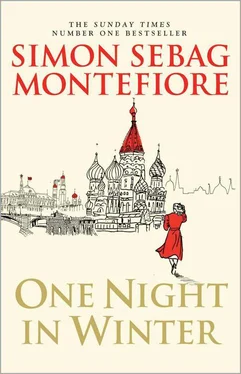What to tell? What to hide? Get it wrong and you can lose your head. And not just you but your family and friends, anyone linked to you. Like a party of mountaineers, when one falls, all fall.
Yet Serafima has a stake even higher than life and death: she’s eighteen and in love. As she stares at her two friends who had been alive just seconds earlier, she senses this is the least of it and she is right: every event in Serafima’s life will now be defined as Before or After the Shootings.
Looking at the bodies of her friends, she sees the events of the day with magnified vividness. It’s 24 June 1945. The day that Stalin reviews the Victory Parade. Yes, it’s one of those occasions when every Russian remembers where they are, like 22 June 1941, the day the Nazis invaded. The war’s over, the streets teem with drunken, singing crowds. Everyone is certain that a better, easier Russia will emerge from the war. But this depends on one man whose name is never uttered by sensible people except in reverent praise.
Serafima cares nothing for all this. She thinks only of love, even though her lover is a secret, and for good reason. Usually when schoolgirls nurture such a secret, they confide every detail to their closest girlfriends. This isn’t Serafima’s style: she knows from her own family that gossip can prove fatal in their age of witchhunting. She also knows that she’s somehow different even if she cannot quite decide why. Perhaps it’s growing up in her mother’s shadow. Perhaps it’s just the way she’s made. She is convinced that no one in all of human existence has ever known such a passion as hers.
This morning, she is woken by the oompah rhythms of the military bands practising their Glinka down the street, the rumble of tank engines, the clip of cavalry hooves on pavements, and she gets out of bed with the bruised feeling that she has scarcely slept.
Her father, Constantin Romashkin, knocks on her door. ‘You’re awake already? You’re excited about the parade?’
She goes to the window. ‘Oh no, it’s raining.’
‘It’ll stop for the parade.’ But it doesn’t. ‘Shall we wake your mother?’
Serafima walks along the parqueted, chandeliered corridor to her parents’ room, past the framed poster advertising the movie Katyusha , which is dominated by a statuesque woman in army uniform, toting a machine-gun against a military background. She has jet-black hair and smudges of gun oil on her cheeks like a Cherokee brave. Dramatic letters declare that the movie stars ‘SOPHIA ZEITLIN’ (Serafima’s mother); and its script is written ‘BY CONSTANTIN ROMASHKIN’ (Serafima’s father). Katyusha is the Soviet soldiers’ favourite film by Stalin’s top scriptwriter. Serafima has a strong impression that it was through such scripts that her papa had romanced her mama – it’s certainly the way he has kept her.
The bedroom. A heap of silk sheets. There lies ‘Katyusha’ herself. Long black hair, a bare plump arm. Serafima smells her mother’s familiar aura of French scent, French cigarettes, French face cream.
‘Mama, wake up!’
‘God! What time is it? I have to look good today – I have to look good every day. Light me a cigarette, Serafimochka.’
Sophia sits up; she’s naked; her breasts are full. Somehow though, she is already holding a cigarette in an ivory holder. Her father, anxious and fastidious, is pacing up and down.
HE We mustn’t be late.
SHE Stop bothering me!
HE You’re always late. We can’t be late this time.
SHE If you don’t like it, divorce me!
Finally, they’re dressed and ready. Serafima unlocks the front door just as the doors of all the capacious parquet-floored, high-ceilinged apartments are opening in the pink wedding cake of the Granovsky building (otherwise known as the Fifth House of the Soviets). The other élite families are coming downstairs too.
In the stairway: the voices of children tremulous with excitement; the creak of well-polished leather, the clip of boot-heels; the jiggling of medals, pistols clinking against belts with starred buckles. First, her parents greet the smug Molotovs – he’s in a black suit like a bourgeois undertaker, pince-nez on a head round as a cannonball, his tomahawk-faced wife Polina in mink. Just ahead of them: Marshal Budyonny of the waxed moustaches as wide as bicycle handlebars is singing a Cossack ditty (soused? At 8 a.m.?), a pretty new wife preening behind him.
On the first landing: Hercules Satinov is in his general’s dress uniform, red-striped trousers and scarlet shoulderboards with golden stars. Her mother embraces Hercules – a family friend since before the Revolution. The Satinov children nod at Serafima with the complicity of school conspirators. ‘What’s news?’ asks George Satinov eagerly. He always says that. She saw them last night at the Aragvi Restaurant and this afternoon they are going to do what they always do. They’re going to play the Game.
‘Communist greetings, Serafimochka,’ says Comrade Satinov. Serafima nods back. To her, he’s a chilly, passionless statue, typical of the leaders. Granite and ice – and hair gel. She knows he’ll soon be standing beside Stalin atop Lenin’s Mausoleum.
‘I think the rain will stop for Comrade Stalin,’ says Mariko, the Satinovs’ six-year-old daughter. She has braided hair and a toy dog under her arm.
‘Probably,’ laughs Tamara, Comrade Satinov’s wife.
Out into the car park. Warm summer rain. The air pregnant with the closeness of thunder, the sticky aromas of lilac and apple blossom. Serafima worries that in the dampness, her hair is curling into a frizz of fair corkscrews, and her powder-blue dress with its white collar is losing its shape. For all the high heels, bell-shaped hats and the men’s scarlet-visored caps, she can already smell the staleness of sweat and waterlogged satin.
Uniformed bodyguards wait, bearing opened umbrellas. The armoured limousines, headlights as big as planets, curves like showgirls, speed forward, one by one, to ferry them the short distance to the Great Kremlin Palace. A traffic jam curls almost twice around its red walls.
SERAFIMA Why are we driving?
PAPA It’s only a hundred metres.
MAMA You try walking anywhere in such high heels! You don’t know anything about women, Constantin!
Serafima thinks of her lover. ‘Missing you, loving you, wanting you,’ she whispers. Somewhere not too far away, is he doing the same?
The car deposits them outside the Great Kremlin Palace. The red crenellated fortifications, golden onion domes, ochre and white palaces, are so familiar Serafima scarcely notices them.
What she sees is her entire world as she walks through the Kremlin. She emerges beside the mausoleum, which resembles an Aztec temple. Made of red marble, mottled like an old lady’s skin, it looks much lower than it does on the cinema screen. Behind barriers and guards, a wooden grandstand has been erected for the Bolshevik nobility. Serafima knows everything in their lives is secret but nothing is private. She is a ‘golden child’, and all the ‘golden children’ attend the same schools, holiday in the same resorts, and, when they grow up, they marry each other. Everyone knows their place and every word has several meanings.
Her best friend Minka Dorova kisses her. She is with her little brother, Senka, aged ten. Their father Genrikh, also in uniform, gives Serafima a beige smile and a clammy handshake. He is the authority on what does or doesn’t constitute ‘Bolshevik virtue’. Minka once confided that when she was a baby, her father placed a portrait of Stalin in her crib.
Her other schoolfriends are there too and just about every commissar, marshal, arctic explorer, composer, or actress she has ever heard of. And their children, most of them from her School 801. A general is bowing at someone. Serafima peers around his shoulderboards and there’s Svetlana, Stalin’s sturdy, freckled, red-haired daughter, who’s not much older than her. She is with her brother, who is wearing an air force general’s uniform, and swigging from a hip flask. Vasily Stalin smiles wanly at Serafima and even when she looks away, she feels his surly eyes on her.
Читать дальше












